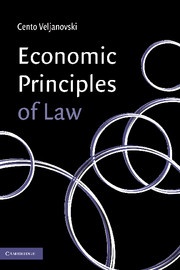1 - Introduction
Published online by Cambridge University Press: 03 December 2009
Summary
courts in their function of declaring, clarifying and extending legal principle must take seriously the economic consequences of what they are doing.
Hon. Mr Justice Kirby, 1998The common law is the core of the British legal system and that of over fifty other countries originally under British rule. It is one of the great legal systems, and one whose basic principles provide the core of today's open and free societies (table 1.1). Yet the common law is also an enigma – seen as an engine of wealth maximisation and economic freedom but at the same time opaque and shrouded in ambiguity. It is in the eyes, even of many lawyers, incoherent, irrational and frequently ‘unfair’. In this, some say, it shares many of the attributes of the marketplace.
This book applies economics to the common law. It has two objectives – to show how economics has and can be used to study law; and to undertake specific analyses of the common law of property, contract, tort and crime. It is an example of the general field known as ‘the economic approach to law’, or simply ‘law and economics’. This is the application of economic theory and quantitative techniques to analyse the rules and remedies of the law.
The economic approach to law is not confined to areas of law which have economic objectives but to all areas of the common law and beyond to family, crime and procedural law and institutions, where the economic content is not apparent.
- Type
- Chapter
- Information
- Economic Principles of Law , pp. 1 - 18Publisher: Cambridge University PressPrint publication year: 2007



